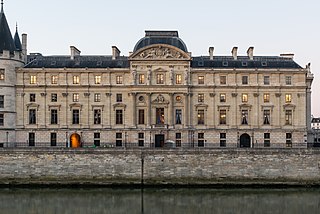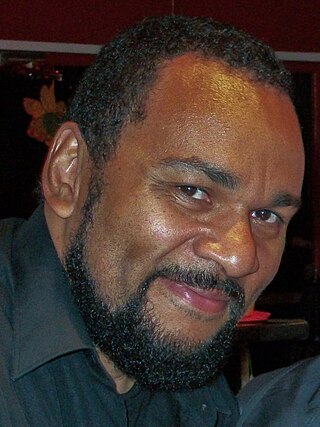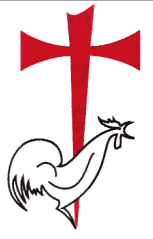
Jean Louis Marie Le Pen, known as Jean-Marie Le Pen, is a French far-right politician who served as president of the National Front from 1972 to 2011 and Honorary President of the same party from 2011 to 2015.

The Court of Cassation is the supreme court for civil and criminal cases in France. It is one of the country's four apex courts, along with the Council of State, the Constitutional Council and the Jurisdictional Disputes Tribunal.

In France, the Conseil d'État is a governmental body that acts both as legal adviser to the executive branch and as the supreme court for administrative justice, which is one of the two branches of the French judiciary system. Established in 1799 by Napoleon as a successor to the King's Council, it is located in the Palais-Royal in Paris and is primarily made up of top-level legal officers. The Vice President of the Council of State ranks as the ninth most important civil servant in France.

Dieudonné M'bala M'bala, generally known by his stage name Dieudo, is a French comedian, actor and political activist. He has been convicted for hate speech, advocating terrorism, and slander in Belgium, France and Switzerland.
France has a long history of governmental censorship, particularly in the 16th to 19th centuries, but today freedom of press is guaranteed by the French Constitution and instances of governmental censorship are limited.

The Supreme Court of Cassation is the highest court of appeal or court of last resort in Italy. It has its seat in the Palace of Justice, Rome.

Les Identitaires, formerly the Bloc identitaire, is an Identitarian nationalist movement in France. Like the French New Right, some generally consider the movement far-right or sometimes as a syncretic mixture of multiple ideologies across the political spectrum.
The Mouvement contre le racisme et pour l'amitié entre les peuples is a French NGO which describes itself as anti-racist. It was founded in 1949.

Debout la France is a French political party founded by Nicolas Dupont-Aignan in 1999 under the name Debout la République as the "genuine Gaullist" branch of the Rally for the Republic. It was relaunched again in 2000 and 2002 and held its inaugural congress as an autonomous party in 2008. At the 2014 congress, its name was changed to Debout la France!.

The courts of appeal are the main appellate courts in the judicial system of Belgium, which hear appeals against judgements of the tribunals of first instance, the enterprise tribunals and the presidents of those tribunals in their judicial area. There are five courts of appeal for each of the five judicial areas, which are the largest geographical subdivisions of Belgium for judicial purposes. The division of the Belgian territory into the five judicial areas is laid down in article 156 of the Belgian Constitution. A judicial area covers multiple judicial arrondissements ("districts"), except for the judicial area of Mons. Each arrondissement has a tribunal of first instance. Further below, an overview is provided of the five courts of appeal and the judicial arrondissements their judicial area covers. The courts of appeal do not hear appeals against judgements of the labour tribunals; these are heard by the courts of labour.

The Belgian Anti-Racism Law, in full, the Law of 30 July 1981 on the punishment of certain acts inspired by racism or xenophobia, is a law against hate speech and discrimination passed by the Federal Parliament of Belgium in 1981 which made certain acts motivated by racism or xenophobia illegal. It is also known as the Moureaux Law, as it was proposed to the Parliament by Justice Minister Philippe Moureaux.
The hate speech laws in France are matters of both civil law and criminal law. Those laws protect individuals and groups from being defamed or insulted because they belong or do not belong, in fact or in fancy, to an ethnicity, a nation, a race, a religion, a sex, a sexual orientation, or a gender identity or because they have a handicap. The laws forbid any communication which is intended to incite discrimination against, hatred of, or harm to, anyone because of his belonging or not belonging, in fact or in fancy, to an ethnicity, a nation, a race, a religion, a sex, a sexual orientation, or a gender identity, or because he or she has a handicap.
Antisemitism in France has become heightened since the late 20th century and into the 21st century. In the early 21st century, most Jews in France, like most Muslims in France, are of North African origin. France has the largest population of Jews in the diaspora after the United States—an estimated 500,000–600,000 persons. Paris has the highest population, followed by Marseilles, which has 70,000 Jews. Expressions of antisemitism were seen to rise during the Six-Day War of 1967 and the French anti-Zionist campaign of the 1970s and 1980s. Following the electoral successes achieved by the extreme right-wing National Front and an increasing denial of the Holocaust among some persons in the 1990s, surveys showed an increase in stereotypical antisemitic beliefs among the general French population.

Civitas, also known as France Jeunesse Civitas and Institut Civitas, was an association generally considered to be Traditionalist Catholic, integrist, nationalist, and of the extreme right. The association defines itself as a "Traditionalist Catholic lobby group". The group was once associated with the Society of St. Pius X, but it has evolved under the new leadership of Alain Escada and the "chaplaincy" is now provided by Capuchin Friars of Morgon. On February 14, 2023, the Global Project Against Hate and Extremism (GPAHE) released a report in which it classified Civitas as a "religious nationalist", "anti-LGBTQ+", and "conspiracy" group.

In France, a cour d’appel of the ordre judiciaire (judiciary) is a juridiction de droit commun du second degré, an appellate court of general jurisdiction. It reviews the judgments of a tribunal judiciaire. When one of the parties is not satisfied with the trial court’s judgment, the party can file an appeal. While decisions of a court of first instance are termed "jugements" in French, a court of appeals hands down an arrêt, which may either affirm or reverse the judgment of the court below. An arrêt (judgment) of the court of appeals may be further appealed en cassation. If the appeal is admissible at the cour de cassation, that court does not re-judge the facts of the matter a third time, but may investigate and verify whether the rules of law were properly applied by the lower courts.

Georges Bensoussan is a French historian. Bensoussan was born in Morocco. He is the editor of the Revue d'histoire de la Shoah. He won the Memory of the Shoah Prize from the Jacob Buchman Foundation in 2008.
Sarah Halimi was a retired French doctor and schoolteacher who was attacked and killed in her apartment on 4 April 2017. Circumstances surrounding the killing—including the fact that Halimi was Jewish, and that the assailant had shouted Allahu akbar during the attack and afterward proclaimed "I killed the Shaitan"—cemented the public perception, particularly among the French Jewish community, that it was a stark example of antisemitism in modern France.

Terre et Peuple is a far-right and neo-pagan cultural association in France founded by Pierre Vial and launched in 1995. Its positions are close to the Identitarian movement, although it precedes that movement and its terminology.
Nick Conrad is the artistic name of a French rapper. He was barely known before coming to national attention in 2018 for his song and video "Pendez les Blancs", for which he was prosecuted. Conrad has defended the violent, anti-French and anti-white nature of his songs and videos as works of fiction and art.
The counter-jihad movement in France consists of various organisations and individuals such as Riposte Laïque and Republican Resistance, led by Pierre Cassen and Christine Tasin respectively, Observatory on Islamisation, and other groups such as those founded by Alain Wagner. The movement has cooperated with the Bloc Identitaire, Daniel Pipes and the Middle East Forum, Stop Islamisation of Europe, and has organised events such as the "Apéro Géant: saucisson et pinard", a happy hour gathering of wine and deli meat cold cuts whose ingredients include pork.













